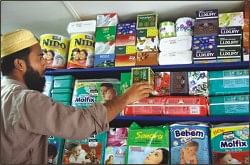A major player in lifestyle

A salesman takes a tissue paper box off a shelf of his shop in Dhaka. Demand for tissue products is more than 4,000 tonnes a year, according to industry people.Photo: Syed Zakir Hossain
From a washroom in a five-star hotel to a retail shop in a remote village, hospitals to restaurants and fast-food shops, local tissue papers are available with a variety ranging from toilet rolls to tissues with stylish logo, from paper boxes to tiny packs.
It's always been there.
The local tissue paper industry meets demand for toilet paper, kitchen towels, clinical bed sheet or facial tissue by multi-dimensional people -- from posh guests in the flights of local airlines to the students in a distant village.
The industry has turned from almost nothing into a billon taka market in the past 20 years and reached a good number of people.
In 1987, prominent business house Kallol Group started importing the Fay tissue and introduced it to different restaurants and party centres, along with serving the elite class of the society.
“We import the jumbo rolls of the tissue and then we put our effort to cut and pack those by ourselves,” said Sheikh Shahid Ali, assistant general manager of Kallol Group.
“At the beginning, we used to provide tissue papers to local restaurants and party centres for free of cost,” he said, adding that it was a business strategy for the introduction of the product.
He said the strategy succeeded and gradually the item became a necessity among the middle and higher middle class.
“Earlier the use of tissue was very limited, only among the people belonging to the higher income group,” Ali said.
However, demand for tissue paper got a pace when local manufacturers started production.
Now the local demand is more than 4,000 tonnes per annum, according to the industry people.
In 2000, Basundhara Group started manufacturing the item locally.
“The increasing usage inspired us to go for manufacturing the item,” said Mustafizur Rahman, deputy managing director (DMD) of the Basundhara Group, pointing to the fact that improvement in the living standard has contributed to such an increased demand.
He said major clients of the locally produced tissue paper are the five star and three star hotels, restaurants, corporate houses, airlines and hospitals.
He said the local pharmaceutical industries are also big consumers, as they prepare courtesy tissue boxes for retail sellers.
The market size of the local tissue industry is around Tk 120 crore with a 20 percent growth a year.
After meeting the local demand, Bangladesh made tissues have also found some export destinations.
The Basundhara Group DMD said his company now exports tissues to the South Asian countries, especially India, Nepal and Bhutan, and to Turkey and England as well.
“There is a huge demand for clinical bed sheets, kitchen towel and facial tissues in South Asian countries,” Rahman added.
New companies are coming up nowadays to invest in the sector, according to him.
In 2006, Nissho Koeki Tissue Papers Company, a Japan-Bangladesh joint venture, launched a new brand Bangla tissue in the local market.
However, the growth and potentials of the sector is not still recognised by the government, the industry people lament.
Rahman said the government does not provide any kind of incentives to the industry, which could help the sector grow.
“Pulp, a raw material for tissue paper which is now being imported, could be produced locally, if the government extends support to the industry,” the Basundhara Group DMD maintained.
A senior director of Nissho Koeki Tissue Papers Company Ltd, who preferred not to be named, suggested the government reduce the import duty on ingredients of the tissue.

 For all latest news, follow The Daily Star's Google News channel.
For all latest news, follow The Daily Star's Google News channel. 



Comments